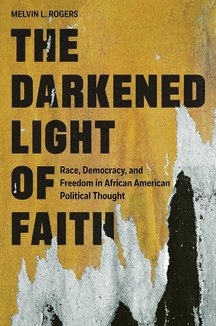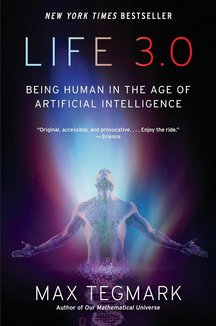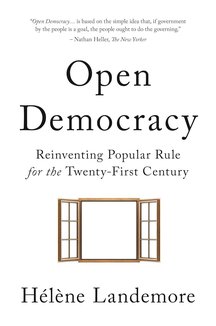Recommended Books

The Darkened Light of Faith: Race, Democracy, and Freedom in African American Political Thought
Author:
Melvin L. Rogers
ISBN 13:
978-0691219134
A powerful new account of what a group of nineteenth- and twentieth-century African American activists, intellectuals, and artists can teach us about democracy Could the African American political tradition save American democracy? African Americans have had every reason to reject America’s democratic experiment. Yet African American activists, intellectuals, and artists who have sought to transform the United States into a racially just society have put forward some of the most original and powerful ideas about how to make America live up to its democratic ideals. In The Darkened Light of Faith , Melvin Rogers provides a bold new account of African American political thought through the works and lives of individuals who built this vital tradition—a tradition that is urgently needed today. The book reexamines how figures as diverse as David Walker, Frederick Douglass, Anna Julia Cooper, Ida B. Wells, W.E.B. Du Bois, Billie Holiday, and James Baldwin thought about the politics, people, character, and culture of a society that so often dominated them. Sharing a light of faith darkened but not extinguished by the tragic legacy of slavery, they resisted the conclusion that America would always be committed to white supremacy. They believed that democracy is always in the process of becoming and that they could use it to reimagine society. But they also saw that achieving racial justice wouldn’t absolve us of the darkest features of our shared past, and that democracy must be measured by how skillfully we confront a history that will forever remain with us. An ambitious account of the profound ways African Americans have reimagined democracy, The Darkened Light of Faith offers invaluable lessons about how to grapple with racial injustice and make democracy work.

Life 3.0: Being Human in the Age of Artificial Intelligence
Author:
Max Tegmark
ISBN 13:
978-1101970317
NEW YORK TIMES BESTSELLER • How will Artificial Intelligence affect crime, war, justice, jobs, society and our very sense of being human? The rise of AI has the potential to transform our future more than any other technology—and there’s nobody better qualified or situated to explore that future than Max Tegmark, an MIT professor who’s helped mainstream research on how to keep AI beneficial. How can we grow our prosperity through automation without leaving people lacking income or purpose? What career advice should we give today’s kids? How can we make future AI systems more robust, so that they do what we want without crashing, malfunctioning or getting hacked? Should we fear an arms race in lethal autonomous weapons? Will machines eventually outsmart us at all tasks, replacing humans on the job market and perhaps altogether? Will AI help life flourish like never before or give us more power than we can handle? What sort of future do you want? This book empowers you to join what may be the most important conversation of our time. It doesn’t shy away from the full range of viewpoints or from the most controversial issues—from superintelligence to meaning, consciousness and the ultimate physical limits on life in the cosmos.

Open Democracy: Reinventing Popular Rule for the Twenty-First Century
Author:
Hélène Landemore
ISBN 13:
978-0691212395
" Open Democracy envisions what true government by mass leadership could look like."―Nathan Heller, New Yorker How a new model of democracy that opens up power to ordinary citizens could strengthen inclusiveness, responsiveness, and accountability in modern societies To the ancient Greeks, democracy meant gathering in public and debating laws set by a randomly selected assembly of several hundred citizens. To the Icelandic Vikings, democracy meant meeting every summer in a field to discuss issues until consensus was reached. Our contemporary representative democracies are very different. Modern parliaments are gated and guarded, and it seems as if only certain people―with the right suit, accent, wealth, and connections―are welcome. Diagnosing what is wrong with representative government and aiming to recover some of the lost openness of ancient democracies, Open Democracy presents a new paradigm of democracy in which power is genuinely accessible to ordinary citizens. Hélène Landemore favors the ideal of “representing and being represented in turn” over direct-democracy approaches. Supporting a fresh nonelectoral understanding of democratic representation, Landemore recommends centering political institutions around the “open mini-public”―a large, jury-like body of randomly selected citizens gathered to define laws and policies for the polity, in connection with the larger public. She also defends five institutional principles as the foundations of an open democracy: participatory rights, deliberation, the majoritarian principle, democratic representation, and transparency. Open Democracy demonstrates that placing ordinary citizens, rather than elites, at the heart of democratic power is not only the true meaning of a government of, by, and for the people, but also feasible and, today more than ever, urgently needed.